

Senegal launches online portal to boost SMEs sales. Côte d'Ivoire : Abidjan ouvre sa première université technologique en 2017, fruit de la coopération Ivoiro-Colombienne. Electronique, NTIC, Agro-économie.
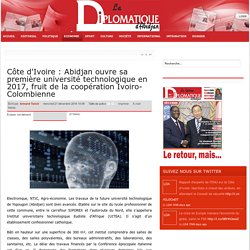
Le Soleil - Hébergement des données informatiques : La Sonatel se dote d’un datacenter. La société nationale des télécommunications (Sonatel) est en train de finaliser les travaux de construction de son datacenter ou centre de données afin de gérer les besoins internes et externes de l’entreprise.
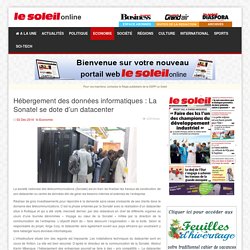
Réaliser de gros investissements pour répondre à la demande sans cesse croissante de ses clients dans le domaine des télécommunications. C’est la phase entamée par la Sonatel avec la réalisation d’un datacenter situé à Rufisque et qui a été visité, mercredi dernier, par des rédacteurs en chef de différents organes au cours d’une tournée dénommée « Voyage au cœur de la Sonatel » initiée par la direction de la communication de l’entreprise. Senegal to get bank-backed digital currency. eCurrency Mint Limited (eCurrency) announced today that it has partnered with Banque Régionale de Marchés (BRM) to provide a digital currency in the West African Economic and Monetary Union (WAEMU).
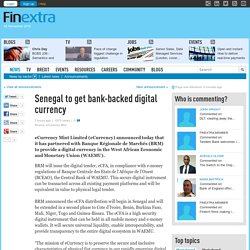
BRM will issue the digital tender, eCFA, in compliance with e-money regulations of Banque Centrale des Etats de l’Afrique de l’Ouest (BCEAO), the Central Bank of WAEMU. This secure digital instrument can be transacted across all existing payment platforms and will be equivalent in value to physical legal tender. Hausse du parc d'abonnés à Internet avec plus de 8 millions d'usagers (rapport) Dakar, 1-er sept (APS) - Le parc d'abonnés à Interneta enregistré une hausse de 4,2% et s'établit au cours de ce trimestre à 8.143.086 usagers, révèle l'Observatoire du marché des télécommunications publié par l'Agence de régulation des télécommunications et des postes (ARTP).

La croissance du parc a ralenti comparée à celle enregistrée le trimestre précédent, note le rapport parvenu à l'APS, jeudi. Senegal's Farmers Adopt New Tool to Boost Harvests - Mobile Phones. AnalysisBy Emmanuelle Landais Sikilo — When birds and clouds are no longer an accurate indicator of rain, text messages can step in Walking through his dry millet field, Alioune Djaby, chief of Sikilo village, waits for a sign that rainfall is coming.
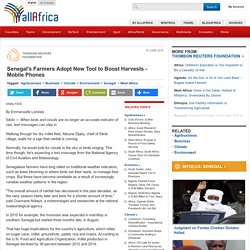
Normally, he would look for clouds in the sky or birds singing. This time though, he's expecting a text message from the National Agency of Civil Aviation and Meteorology. Senegalese farmers have long relied on traditional weather indicators, such as trees blooming or where birds set their nests, to manage their crops. "The overall amount of rainfall has decreased in the past decades, as the rainy season starts later and lasts for a shorter amount of time," said Ousmane Ndiaye, a meteorologist and researcher at the national meteorological agency. Senegalese Invents Mobile Software that helps prevent bus fare fraud. AfDB Board Approves €70 million For Construction Of Senegal’s Digital Technology Park. In its bid to contribute to promoting Senegal as an information and communications technology (ICT) centre of excellence and a destination for the establishment of call centers, e-commerce, software development, wireless Internet facilities and other ICT market segments, the African Development Bank (AfDB) will inject €70.61 million in the sector.
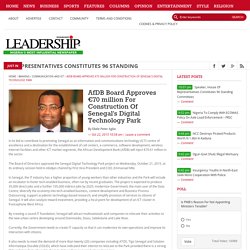
The Board of Directors approved the Senegal Digital Technology Park project on Wednesday, October 21, 2015, at its ordinary session held in Abidjan chaired by First Vice-President and COO, Emmanuel Mbi. In Senegal, the IT industry has a higher proportion of young workers than other industries and the Park will include an incubator to foster tech-enabled business, often run by recent graduates. By creating a sound IT foundation, Senegal will attract multinationals and companies to relocate their activities to the new urban centre developing around Diamniadio, Diass, Sebikotane and Lake Rose. The Senegal tech hub run by women for women.
Coudy Binta De's eyes light up when she talks about how she first became fascinated with computers.
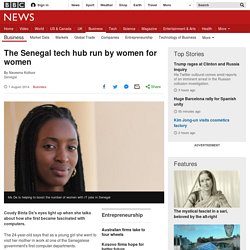
The 24-year-old says that as a young girl she went to visit her mother in work at one of the Senegalese government's first computer departments. "Seeing those big computers, with their black screens and green text, was just amazing for me," says Ms De, who was inspired to grow up and become a computer engineer in Senegal. With women holding less than 30% of information technology (IT) sector jobs around the world, encouraging and helping more people like Ms De get work in the industry has long been an aim for policymakers and equality campaigners alike. And perhaps unsurprisingly, the percentage of women working in IT across Africa is even lower than the global average.
In Senegal itself recent data is hard to come by, but a report published in 2009 by the International Youth Foundation said women held only 35% of IT jobs in the country. Viva Senegal: How this West African nation became Africa's quiet high-tech titan. ALL too often conversations on the digital scene in Africa look to the East - focusing on the gains being made in Rwanda and Kenya in particular.
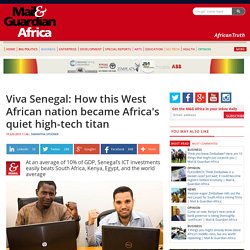
When they do go West, Nigeria takes precedence because of the sheer size of the country’s economy and population, dwarfing the remarkable progress made by (Francophone) Senegal, which is not fully acknowledged in both the dominant regional and international technology press that is written in English. Currently in Senegal, 83% of the population has a mobile telephone with 40% of these being smartphones allowing users to access the internet. This has seen tremendous growth in the country. In 2013 20.90% of the population was using the internet, compared to 1.9% in Ethiopia or 12.30% in Ghana.
In 2009, the government launched it’s own intranet resource centre which allows it to use e-government to strengthen the use of Information Technology and Communication (ICT) for the development of the country. Technology park.